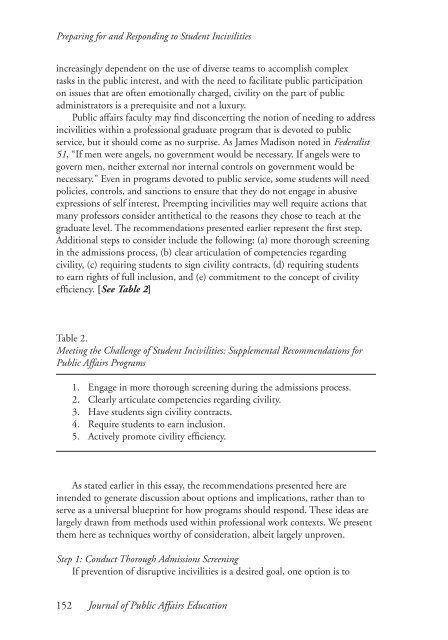JOURNAL OF PUBLIC AFFAIRS EDUCATION - Naspaa
JOURNAL OF PUBLIC AFFAIRS EDUCATION - Naspaa
JOURNAL OF PUBLIC AFFAIRS EDUCATION - Naspaa
Create successful ePaper yourself
Turn your PDF publications into a flip-book with our unique Google optimized e-Paper software.
Preparing for and Responding to Student Incivilitiesincreasingly dependent on the use of diverse teams to accomplish complextasks in the public interest, and with the need to facilitate public participationon issues that are often emotionally charged, civility on the part of publicadministrators is a prerequisite and not a luxury.Public affairs faculty may find disconcerting the notion of needing to addressincivilities within a professional graduate program that is devoted to publicservice, but it should come as no surprise. As James Madison noted in Federalist51, “If men were angels, no government would be necessary. If angels were togovern men, neither external nor internal controls on government would benecessary.” Even in programs devoted to public service, some students will needpolicies, controls, and sanctions to ensure that they do not engage in abusiveexpressions of self interest. Preempting incivilities may well require actions thatmany professors consider antithetical to the reasons they chose to teach at thegraduate level. The recommendations presented earlier represent the first step.Additional steps to consider include the following: (a) more thorough screeningin the admissions process, (b) clear articulation of competencies regardingcivility, (c) requiring students to sign civility contracts, (d) requiring studentsto earn rights of full inclusion, and (e) commitment to the concept of civilityefficiency. [See Table 2]Table 2.Meeting the Challenge of Student Incivilities: Supplemental Recommendations forPublic Affairs Programs1. Engage in more thorough screening during the admissions process.2. Clearly articulate competencies regarding civility.3. Have students sign civility contracts.4. Require students to earn inclusion.5. Actively promote civility efficiency.As stated earlier in this essay, the recommendations presented here areintended to generate discussion about options and implications, rather than toserve as a universal blueprint for how programs should respond. These ideas arelargely drawn from methods used within professional work contexts. We presentthem here as techniques worthy of consideration, albeit largely unproven.Step 1: Conduct Thorough Admissions ScreeningIf prevention of disruptive incivilities is a desired goal, one option is to152 Journal of Public Affairs Education
















